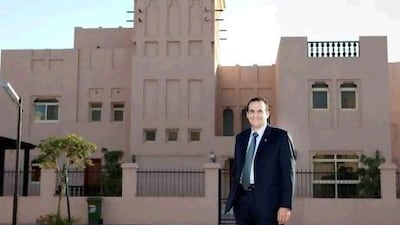Researchers in Ras Al Khaimah are looking to Switzerland for inspiration to design buildings that remain cool and comfortable all year for a fraction of the cost.
At Al Hamra Village, homes are being used as a case study to see whether the Minergie Swiss building standard can be adopted here.
Double-glazed windows, external shading and insulation are among the main components of Minergie houses, which use up to 80 per cent less energy than conventional buildings - resulting in utility bills that can be reduced by up to a third.
Franco Vigliotti, the dean of RAK's Ecole Polytechnique Federale de Lausanne (EPFL) said the technology could "definitely be adopted to this region".
EPFL is a research centre that is leading the project with the support of the RAK Government.
"This is about changing our thinking of a house not as bricks, but as an envelope that has to be airtight," Mr Vigliotti said.
He hopes the study will result in houses being built within the year so residents can feel the benefits.
The Minergie standard is based on properly insulating a building through controlled ventilation, which exchanges outside air with inside air, ensuring constant fresh air at the same temperature.
Ruedi Kriesi, the founder of Minergie, said the same principle could be adopted in the UAE through a mechanical ventilation system that exchanges the hot air entering the house with the cool air leaving it.
Instead of putting heating in the floors as they do in Switzerland, houses in the UAE will have cool water circulating in the ceilings.
The EPFL is planning to adopt the Minergie code for its new campus.
Abu Dhabi's Urban Planning Council has been implementing an environmentally sustainable building standard since 2010 with its Estidama Pearl Rating System, where projects gain points and credits.
Mr Vigliotti said the difference was that Minergie was more focused on the "energy balance of the house, whereas Estidama looks at where the materials come from to minimise the energy consumption".
The obstacles facing such standards in the UAE are financial, as one of the major factors for success in Switzerland was government incentives, he said.
"If this region wants to go beyond being an intensive carbon consumer, there needs to be a way that incentivises sustainable behaviour," Mr Vigliotti said.
One of the incentives to own such a home is the resale value, which is between 30 and 40 per cent higher than that of a normal house.
In Switzerland, more than 25 per cent of houses are Minergie certified. Mr Vigliotti said the abundance of such buildings had resulted in additional construction costs dropping below 10 per cent.
Jean-Louis Tardent, who became the first person to build a Minergie standard home in Switzerland 18 years ago, said it was "so comfortable, I don't even go outside".
The price to build his three-bedroom house, which uses less than a third of the energy used by his neighbours, was between 15 and 20 per cent more than a normal home.
The temperature in his home is regulated to a constant 21°C in every room and the air is always fresh.
A Minergie-certified building must consume no more than 3.8 litres of fuel for every square metre a year, including water, heating and ventilation, which means five times less than a traditional building.
Mr Kriesi said the buildings in the UAE would need to run on electricity. To be certified they will not be allowed to use more than 30 kilowatt/hours a square metre of house a year.
Mr Vigliotti said it would take time to fully integrate Minergie in the UAE, as it is about "rethinking the way we value energy".
But he said: "We are experiencing a change in mindset about the environment and this decade will probably be historical in that sense."
